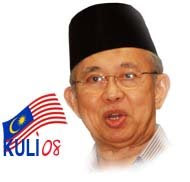STRANGE POLITICS
Something strange is happening in Malaysian politics. Suddenly there is a lot of talk about cooperation and even merger between UMNO and PAS. Friendly and unfamiliar sounds are being heard from all sides.
I wonder whether it is a sudden concern about the need for Malay unity or it is the realisation that both PAS and UMNO have become very weak. True PAS has won more seats in Parliament than it had ever done before. It has even won control over the State of Kedah. But PAS is the weakest party in the opposition coalition or Pakatan Rakyat. This cannot be what PAS aimed for when it decided to soft pedal its Islamic State ambition in order to work with DAP and PKR.
PAS must want to replace UMNO as the dominant party in Malaysia. But despite its success in the 2008 General Election it is not even dominant in the opposition coalition.
I wonder whether it is a sudden concern about the need for Malay unity or it is the realisation that both PAS and UMNO have become very weak. True PAS has won more seats in Parliament than it had ever done before. It has even won control over the State of Kedah. But PAS is the weakest party in the opposition coalition or Pakatan Rakyat. This cannot be what PAS aimed for when it decided to soft pedal its Islamic State ambition in order to work with DAP and PKR.
PAS must want to replace UMNO as the dominant party in Malaysia. But despite its success in the 2008 General Election it is not even dominant in the opposition coalition.
Dato Seri Abdullah Ahmad Badawi on the other hand must be irked by his failure to get a two-third majority in Parliament. It is therefore unable to revise the amendments to the constitution made by previous Barisan Nasional Governments or to introduce his own amendments to the constitution. In any case not getting the usual two-third majority is like losing almost.
He knows he is regarded as a weak leader of a weak Government. His coalition partners do not show much respect for him even though they themselves are weak. And the opposition openly declare they want him to go on leading simply because he is weak; a kind of backhanded compliment.
To become strong he might want to embrace PAS as a coalition partner. Then he would have his two-third majority.
To do this he will have to offer his sweeteners - his usual solution to all problems. Maybe he would offer a second Deputy Prime Minister to (PAS President) Abdul Hadi Awang and Ministership to some other PAS leaders.
But his coalition partners may not take kindly to this plan. MCA, Gerakan and MIC are not likely to welcome this move. Neither would Sabah UMNO members and the other coalition partners in Sabah and Sarawak. The BN Government with PAS as a member would therefore be very shaky. UMNO itself would be very shaky as not every UMNO member would relish the idea of nice positions being given to their erstwhile rivals.
Such a coalition may give BN the two-third majority but it is not likely to please the elctorate. The Malay voters may or may not welcome this unity bid but their concern is with the leadership of Dato Seri Abdullah. They want him out. Participation by PAS in a BN still lead by Dato Seri Abdullah will not mean things would be any better.
By associating with Dato Seri Abdullah, accepting the sweets and soft pedaling PAS' Islamic State raison d'etre, PAS is likely to lose support.
The net gainer may be PKR, Anwar notwithstanding. After all there is clear evidence that many voters voted PKR simply because they wanted to be rid of Dato Seri Abdullah.
Malay unity is not a matter of Malay political parties embracing each other. Malay unity should be entrusted to politically uncommitted Malays. Neither UMNO nor PAS have the credibility needed for this task.
PAS has already laid down conditions. If UMNO accepts these conditions it will lose its non-Malay partners. On the other hand if PAS gives up its stated views on hudud and qisas etc it will lose the support of its followers.
Maybe a compromise can be worked out. But any compromise will result in a loss of faith and support by enough supporters of both parties to weaken them.
This is the dilemma if UMNO seeks PAS' support for achieving a two-third majority or PAS seeks UMNO's support to make it the dominant party in the opposition.
The solution to the present Malay feeling of insecurity is not a merger or some kind of co-operation between the Malay political parties. It lies in restoring UMNO to its previous strength. And this cannot be done for as long as Dato Seri Abdullah is there. There are several leaders in UMNO who are qualified to take over from him, leaders who are not influenced by the greed of their families, leaders who are willing to make sacrifices in order to restore pre-eminent position of UMNO within the BN. One of them could be Rais Yatim. Maybe in the end it would be Tengku Razaleigh Hamzah, with Rais as deputy.
It is not the system that is wrong. For 50 years, half a century, the system had worked well. If it fails today it is not because it is wrong but because the leadership had failed to make it work.
The solution: Remove the leader responsible.
He knows he is regarded as a weak leader of a weak Government. His coalition partners do not show much respect for him even though they themselves are weak. And the opposition openly declare they want him to go on leading simply because he is weak; a kind of backhanded compliment.
To become strong he might want to embrace PAS as a coalition partner. Then he would have his two-third majority.
To do this he will have to offer his sweeteners - his usual solution to all problems. Maybe he would offer a second Deputy Prime Minister to (PAS President) Abdul Hadi Awang and Ministership to some other PAS leaders.
But his coalition partners may not take kindly to this plan. MCA, Gerakan and MIC are not likely to welcome this move. Neither would Sabah UMNO members and the other coalition partners in Sabah and Sarawak. The BN Government with PAS as a member would therefore be very shaky. UMNO itself would be very shaky as not every UMNO member would relish the idea of nice positions being given to their erstwhile rivals.
Such a coalition may give BN the two-third majority but it is not likely to please the elctorate. The Malay voters may or may not welcome this unity bid but their concern is with the leadership of Dato Seri Abdullah. They want him out. Participation by PAS in a BN still lead by Dato Seri Abdullah will not mean things would be any better.
By associating with Dato Seri Abdullah, accepting the sweets and soft pedaling PAS' Islamic State raison d'etre, PAS is likely to lose support.
The net gainer may be PKR, Anwar notwithstanding. After all there is clear evidence that many voters voted PKR simply because they wanted to be rid of Dato Seri Abdullah.
Malay unity is not a matter of Malay political parties embracing each other. Malay unity should be entrusted to politically uncommitted Malays. Neither UMNO nor PAS have the credibility needed for this task.
PAS has already laid down conditions. If UMNO accepts these conditions it will lose its non-Malay partners. On the other hand if PAS gives up its stated views on hudud and qisas etc it will lose the support of its followers.
Maybe a compromise can be worked out. But any compromise will result in a loss of faith and support by enough supporters of both parties to weaken them.
This is the dilemma if UMNO seeks PAS' support for achieving a two-third majority or PAS seeks UMNO's support to make it the dominant party in the opposition.
The solution to the present Malay feeling of insecurity is not a merger or some kind of co-operation between the Malay political parties. It lies in restoring UMNO to its previous strength. And this cannot be done for as long as Dato Seri Abdullah is there. There are several leaders in UMNO who are qualified to take over from him, leaders who are not influenced by the greed of their families, leaders who are willing to make sacrifices in order to restore pre-eminent position of UMNO within the BN. One of them could be Rais Yatim. Maybe in the end it would be Tengku Razaleigh Hamzah, with Rais as deputy.
It is not the system that is wrong. For 50 years, half a century, the system had worked well. If it fails today it is not because it is wrong but because the leadership had failed to make it work.
The solution: Remove the leader responsible.










